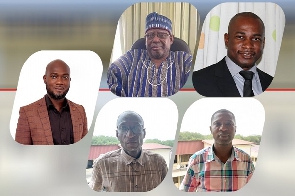Five scholars from the University of Education, Winneba (UEW) have won an amount of €798,906.00 to carry out a research project titled "Building Capacity for Online Tuition in Ghana." The five are Prof. Issifu Yidana, Prof. Benjamin Ghansah, Dr. Ephrem Kwaa-Aidoo, Dr. Charles Buabeng-Andoh, and Dr. Wilson Osafo Apeanti.
The project, a collaboration between the UEW and the University of Cape Coast (UCC) in Ghana, with active support from the University of Tampere in Finland and Tallinn University in Estonia, aims to build capacity in higher education through the development of comprehensive digital education delivery strategies, the sharing of best practises, and the development of new effective practises to broaden the knowledge base and enhance the long-term quality of education.
The grant for the 36-month project was awarded by the European Education and Culture Executive Agency. Participating universities are current and future forerunners in utilising digital learning environments. Thus, the project seeks to build a lasting impact on the target area, and the results will support equality and inclusion among citizens.
The project, which was inspired by the COVID-19 pandemic, goes beyond that to develop a sustainable digital learning policy in sub-Saharan Africa and to transform the direction of digital delivery in Ghana's higher education institutions. Additionally, it plans to scale up strategic planning, the creation of cutting-edge pedagogical approaches, and delivery of digital education.
An educational research-based action plan, including the development of the delivery system and staff training, is anticipated to come out of the project. This will make it feasible to assist UEW and UCC research and innovation in digital education.
It is expected to cause a shift towards data-driven and evidence-based methods of providing digital education at UEW and UCC, changing the thinking of researchers, educators, and providers of digital solutions. The initiative will emphasise the professional development of teachers in higher education in Ghana and significantly influence the development of digital delivery capabilities.
The outbreak of the COVID-19 pandemic imposed unimaginable challenges on higher education institutions globally. Ghana recorded its first case of the coronavirus on Thursday, 12th March, 2020. Consequently, the government implemented a series of measures, including a lockdown of all educational institutions, to reduce the spread of the virus in the country.
This directive by the government interrupted the academic calendar for all institutions throughout the country, requiring UEW and UCC to implement innovative solutions to address the challenges imposed by the COVID-19 pandemic and bring the 2019/2020 academic year to a successful close.
Based on their COVID-19 pandemic experiences, UEW and UCC intend to use hybrid instructional delivery of all their programmes in the post-COVID-19 era to ensure that all students have equal access to high-quality education.
The benefits of improved digital delivery of education extend beyond educational organisations. The use of digital platforms and systems in learning and teaching improves the overall digital literacy of teachers and students. Planned cooperative systematic development of digital education delivery aims to boost digital transformation and data technologies of UEW and UCC.
Digitalisation is a preferred approach to ensuring sustainable growth in education in general and enables economic development and the creation of new jobs in the field of digital systems. Effective use of digital education tools enables the provision of high-quality teaching to a large number of students.
Regional News of Wednesday, 1 March 2023
Source: Benjamin Ghansah
Five UEW lecturers win €798,906.00 research grant
 Prof. Benjamin Ghansah, Prof. Issifu Yidana (top left), Dr. Ephrem Kwaa-Aidoo (top right), Dr. Charl
Prof. Benjamin Ghansah, Prof. Issifu Yidana (top left), Dr. Ephrem Kwaa-Aidoo (top right), Dr. Charl












